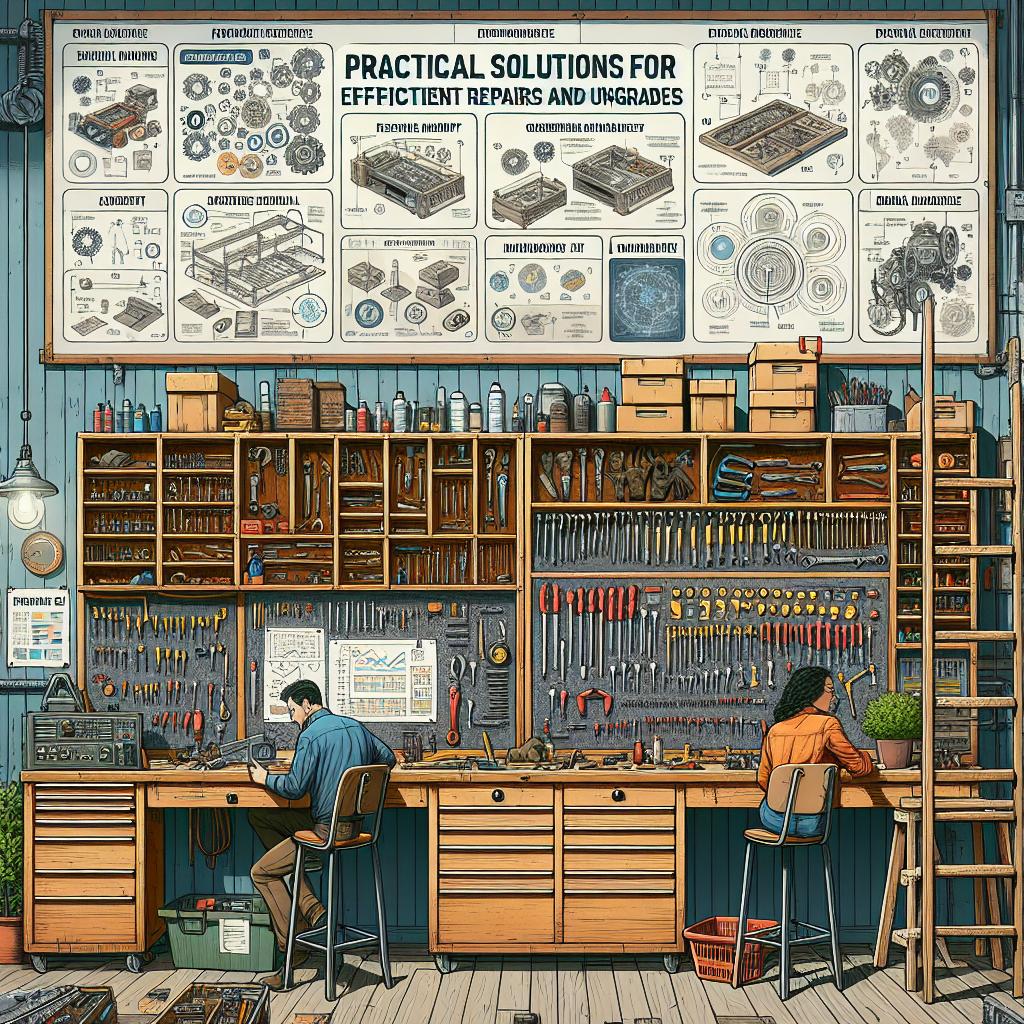In the world of climate control, mini split AC systems have emerged as a popular choice for commercial spaces, offering flexibility and efficiency in managing temperature and comfort levels. However, as with any sophisticated technology, these compact cooling powerhouses can sometimes falter, leading to disruptions in the workplace and discomfort among employees and customers alike. Understanding how to troubleshoot common issues with mini split systems is not just a technical necessity; it’s also a vital component of maintaining a conducive environment for productivity and well-being. In this article, we will explore the typical challenges faced by mini split AC units, providing you with practical insights and strategies to navigate these problems effectively, ensuring that your commercial space remains cool and inviting year-round. Whether you’re a facility manager, business owner, or simply someone keen on enhancing your indoor climate, our guide will equip you with the knowledge needed to keep your mini split AC system running smoothly.
Identifying Signs of Distress in Mini Split AC Systems
When it comes to maintaining the efficiency of mini split AC systems, recognizing the signs of distress is crucial for timely intervention. Unusual noises such as banging, hissing, or rattling can indicate problems ranging from loose components to more serious mechanical issues. Additionally, inconsistent cooling where some spaces remain warm while others become too cold may signal refrigerant leaks or malfunctioning thermostats. Poor airflow can also be a red flag, often due to obstructed filters or damaged ducts. Paying attention to these symptoms can prevent further damage and ensure a comfortable environment in commercial spaces.
It’s essential to monitor the unit’s energy efficiency as well. A noticeable spike in energy bills may indicate that the system is working harder than it should, possibly due to dirty coils or worn-out components. Another sign to watch for is water leakage, which can suggest clogged condensate lines or refrigerant issues. If you notice any unpleasant odors emanating from the unit, it may be time to address mold or mildew build-up. Keeping track of these indicators can help in conducting a thorough troubleshooting process, ensuring the longevity and reliability of your mini split AC systems.

Common Performance Problems and Their Underlying Causes
Mini split AC systems are often preferred in commercial spaces for their efficiency and flexibility, but when they encounter issues, several underlying problems may be at play. Insufficient cooling or heating can result from various factors, such as inadequate refrigerant levels, blocked filters, or malfunctioning thermostats. Similarly, water leaks can be indicative of clogged condensate drains or improper installation. These issues can lead to reduced system performance and potential damage, requiring immediate troubleshooting to restore optimal function.
Another common challenge is unusual noises during operation, which may stem from loose or damaged components, such as fans or compressors. In conjunction with this, inconsistent airflow can occur due to obstructions in the ductwork or improper placement of indoor units. Below is a summary of these performance problems and their potential causes:
| Performance Problem | Underlying Cause |
|---|---|
| Insufficient cooling/heating | Low refrigerant, blocked filters, faulty thermostat |
| Water leaks | Clogged drains, installation issues |
| Unusual noises | Loose components, damaged fans/compressors |
| Inconsistent airflow | Obstructed ducts, improper unit placement |

Maintenance Tips for Ensuring Optimal Functionality
Regular maintenance of mini split AC systems is essential to keep them operating efficiently, particularly in commercial environments where comfort is crucial. Establish a routine maintenance schedule that includes the following tasks:
- Clean or replace filters monthly to ensure maximum airflow and improve air quality.
- Inspect the outdoor unit for debris, such as leaves and dirt, that may obstruct airflow and compromise performance.
- Check refrigerant levels annually, as low refrigerant can lead to inadequate cooling and increased energy consumption.
- Examine electrical connections to prevent potential safety hazards and ensure reliability.
Additionally, don’t overlook the importance of professional servicing. A qualified technician can provide more comprehensive maintenance, including deep cleaning and system checks. Consider maintaining a log of service records to help identify patterns or recurring issues. Below is a simple log table you can adapt for your records:
| Date | Service Performed | Next Scheduled Maintenance | Technician Notes |
|---|---|---|---|
| MM/DD/YYYY | Filter Replacement | MM/DD/YYYY | Cleaned coils |
| MM/DD/YYYY | Refrigerant Check | MM/DD/YYYY | Levels OK |

Practical Solutions for Efficient Repairs and Upgrades
To ensure that your mini split AC system functions smoothly, consider implementing regular inspections and maintenance. A proactive approach can significantly reduce the need for costly repairs. Key tasks to keep in mind include:
- Cleansing the filters: Dirty filters can restrict airflow, making the system work harder and less efficiently.
- Inspecting the outdoor unit: Ensure there are no obstructions around the condenser and that it is free from debris.
- Checking refrigerant levels: Low refrigerant can indicate a leak that needs immediate attention to prevent compressor damage.
Upgrading your mini split system can also enhance its efficiency and lifespan. When considering upgrades, think about:
- Replacing older thermostats: Smart thermostats can be more efficient and adapt to changing environmental conditions automatically.
- Incorporating zoning systems: This allows for tailored cooling in different areas, conserving energy where it’s not needed.
- Investing in higher SEER rated units: Systems with a higher Seasonal Energy Efficiency Ratio (SEER) save money on energy bills over time.
Q&A
Q&A: Troubleshooting Common Issues with Mini Split AC Systems in Commercial Spaces
Q1: What are the primary benefits of using a mini split AC system in a commercial space?
A1: Mini split AC systems offer flexibility and efficiency, making them ideal for commercial spaces. They allow for zone control, meaning different areas can be cooled to different temperatures according to need. Their compact design enables installation in various locations without extensive ductwork, saving on both space and cost. Additionally, many newer models are energy-efficient, which can significantly lower utility bills.
Q2: What are some common problems that can occur with mini split AC systems?
A2: Common issues include inadequate cooling or heating, refrigerant leaks, unusual noises, improper drainage, and the system not turning on. These problems can arise from various factors such as improper installation, lack of maintenance, or external environmental changes affecting the system’s performance.
Q3: How can I identify if my mini split AC system isn’t cooling effectively?
A3: If the system is running but the air feels lukewarm or the temperature doesn’t change, it could indicate a refrigerant leak, dirty filters, or even issues with the compressor. Additionally, if the outdoor unit is freezing over or the air from the vents is weak, these are key signs that something may be off.
Q4: What should I do if I suspect a refrigerant leak?
A4: First, turn off the system to prevent further damage. Look for signs of ice buildup on the evaporator coils or hear hissing sounds near the indoor unit. It’s critical to call a licensed HVAC technician to diagnose and repair the leak, as handling refrigerants requires specialized training and permissions.
Q5: What maintenance can I perform to prevent common issues?
A5: Regular maintenance is vital for keeping your mini split running smoothly. You can clean or replace air filters every month, ensure the outdoor unit is clear of debris, and check the condensate drain for blockages. Scheduling professional tune-ups at least once a year can also catch potential issues before they escalate.
Q6: My system is making strange noises. What does this mean?
A6: Unusual sounds can indicate various issues. A buzzing noise might suggest loose parts, while rattling could point to debris in the fan or other moving components. A squealing sound may indicate problems with the motor or belt. It’s best to have a technician investigate to avoid further complications.
Q7: Sometimes my system just won’t turn on. What could be the reason?
A7: There are several potential reasons your mini split isn’t powering up; check if the remote control batteries are working or if there’s a tripped circuit breaker. If the power source is functioning and the unit still doesn’t power on, there may be a fault in the internal electronics or an issue with the remote itself.
Q8: When should I consider replacing my mini split AC system instead of repairing it?
A8: If your system is over 10-15 years old, frequently breaks down, or the repairs cost more than half the price of a new unit, it may be time to invest in a replacement. New models are often more efficient and can save money in the long run through lower energy costs.
Q9: What advice can you offer for ensuring the longevity of a mini split AC system?
A9: Regular maintenance, keeping the units clean, ensuring proper airflow, and addressing issues as they arise are key factors in prolonging the life of your system. Additionally, using the thermostat wisely—setting it to a consistent temperature rather than frequent adjustments—can reduce wear and tear on the unit.
Q10: How can I find the right HVAC technician for servicing my mini split system?
A10: Look for certified technicians with experience in mini split systems. Online reviews, recommendations from colleagues, and verification of licensing and insurance can help you find a reputable HVAC professional. Trustworthy technicians will also offer transparent pricing and maintain clear communication throughout the service process.
Concluding Remarks
addressing the common issues faced by mini split AC systems in commercial spaces is not only essential for maintaining comfort but also for ensuring the longevity and efficiency of your equipment. By familiarizing yourself with the typical problems—such as inadequate cooling, bizarre noises, and unexpected leaks—you empower yourself to tackle these challenges with confidence. Regular maintenance, along with a proactive approach to troubleshooting, can save both time and money, allowing your business to thrive in a climate-controlled environment. As you navigate the nuances of mini split systems, remember that a little diligence goes a long way. Should issues arise beyond your expertise, enlisting the help of a professional technician can provide peace of mind. With the right knowledge and resources, your mini split AC system can continue to serve as a reliable foundation for your commercial space, adapting to the demands of both your business and your customers. Keep cool, stay prepared, and let the comfort flow.

